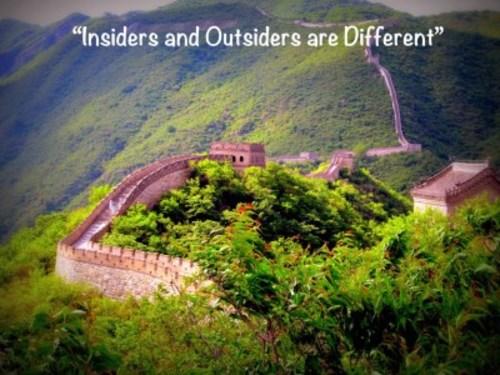
In the mid-1990s, while studying Chinese, I stumbled across a Chinese expression that was a "key" to helping me understand what was going on. I was working through a textbook called Speaking of Chinese Culture that taught about key Chinese cultural rules and values. One chapter was on this Chinese concept called nei wai you bie (内外有别), which means "insiders and outsiders are different."
I asked my tutor how this notion played itself out in everyday life, and she said, "Well, it's why you have to pay more for the entrance ticket to the park than I do."
"You mean, they're not doing it merely to cheat me?" I asked.
"No," she replied. "Why should you, as an outsider be treated the same as an insider?"
Lights, bells, and whistles went off in my head, exploding in a cacophony of comprehension. Suddenly, so many other things that I had seen and experienced began to make sense.
A few years later, I was studying with a professor in Beijing who added to my understanding by explaining to me that the clearest example of the concept was the Great Wall. (Hmm…that's not what the tourist posters say.)
In the Chinese worldview, there are two kinds of people in the world: Chinese and foreigners. Unlike the English usage of the word "foreigner," which is a relative term, in Chinese it is absolute. Like the terms Jews and Gentiles, they are mutually exclusive. A Chinese cannot be a foreigner and a foreigner cannot be a Chinese.
A few months ago, I had the opportunity to teach an orientation session for a group of Chinese high school students visiting Minnesota for two weeks. I started off with a little "worldview disruption" activity. I asked them a question, "shenme shi waiguoren?" ("什么是外国人?") What is a foreigner?
Even though I could tell by the looks on some of their faces that they suspected it was a trick question, 3000+ years of education and cultural conditioning led them to shout with one accord "You are!"
"Wrong," I said. "For the next two weeks, YOU are!"
They laughed, firm in their belief that I had gone stark-raving mad.
I also saw this illustrated vividly in Beijing many years ago when I attended a talk given by Israel Epstein, a then 89-year-old White Russian Jew who had come to China as a 5-year old to escape the pogroms in Russia. He had stayed on in China, becoming a Chinese citizen, and becoming active in the revolution that brought the Communists to power. He even became a member of the Chinese Communist Party.
I went to the talk with some Chinese friends, and afterwards pressed them on this point. "In your eyes," I asked, "is he a Chinese or a foreigner?" They all agreed that, notwithstanding his 80+ of living in China, and his Chinese citizenship, he was still a foreigner."
Traditional Chinese culture does not hold that "all men are created equal." Instead, it is not only acceptable, but also proper, for different kinds of people to be treated differently. This is the way the world is ordered. A two-tiered price structure is not a problem to be solved; rather it is the way it should be.
Interestingly enough, China did away with the official price discrepancies in the late 1990s in order to meet WTO requirements, but unofficially it still remains in place.A foreigner will often pay more for vegetables in the market than his/her Chinese housekeeper.
Sometimes this concept cuts the foreigner's way, however, since the strong sense of hospitality in Chinese culture dictates that guests be treated with utmost honor and respect. While we may be foreigners, we are also waibin (foreign guests), and are therefore entitled to certain privileges and opportunities that are not afforded to locals. Sometimes we'll be escorted to the front of lines; sometimes ushered into the pews at the front of a church or assembly even as Chinese are being moved out. It may go against my western notion of fair play, but in China, it's what you do for a foreign guest. It's just being polite.
Living well where you don't belong means graciously living as an outsider, with all the accompanying frustrations and undeserved privileges.
"Insiders and Outsiders Are Different" was originally posted on October 14, 2014 Outside-In.
Photo Credits: Beware the Invaders, by Kris Krug, via Flickr, and Joann Pittman

Joann Pittman
Joann Pittman is Vice President of Partnership and China Engagement and editor of ZGBriefs. Prior to joining ChinaSource, Joann spent 28 years working in China, as an English teacher, language student, program director, and cross-cultural trainer for organizations and businesses engaged in China. She has also taught Chinese at the University …View Full Bio
Are you enjoying a cup of good coffee or fragrant tea while reading the latest ChinaSource post? Consider donating the cost of that “cuppa” to support our content so we can continue to serve you with the latest on Christianity in China.